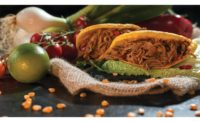Flavor Boosters & Maskers: Challenges in Fermentation
Generating fizz in the active probiotic beverage market

While carbonation usually can be a flavor enhancer on its own, bringing fermented flavors and live probiotics into the mix can counteract that advantage.
PHOTO COURTESY OF: Next Foods Inc. (www.goodbelly.com)

Keep it carbonated and alive — a challenge in masking probiotic spritzers.
PHOTO COURTESY OF: Next Foods Inc. (www.goodbelly.com)


The new lines of probiotic-infused or fermented products are favored for their light and delicate flavors. However, a major challenge for makers of such beverages has been that it can be difficult to mask any undesired fermentation or savory notes in these types of water-heavy products. One of the biggest hurdles is that certain maskers can interfere with the ability of the probiotics within to live and stay strong enough to grow into effective colony forming units (CFUs).
With increased demands for organic and clean-label attributes and a consumer less willing to accept artificial flavors or additives, certain traditional flavor maskers and enhancers have been removed from the developers’ toolbox. And when it comes to better-for-you products, the health and safety needs can end up at odds with certain additives such as live, bioactive ingredients. Of course, flavor is still the most important aspect determining success in a crowded food and beverage market.
Fortunately, thanks to aggressive technological investment and advances, the taste modifier market has expanded greatly in recent years in both the variety and the versatility of its offerings. Maskers and enhancers have had to increase in subtlety to meet multiple challenges, whether helping non-sucrose sweeteners more closely approximate sucrose or to bring an infused or enhanced product’s flavor back to the comfort zone occupied by its original version.
For many mainstream sparkling beverages, carbonation can be a big help. Carbonation is surprisingly good in and of itself at hiding and enhancing certain flavors. This works especially well in carbonated beverages where a reduction in calories is desired. This is because sweetness is heightened with added carbonation, allowing a lower sugar product to be produced. Carbonation activates the taste buds while providing its own flavor notes.
All these issues come to a head when creating a carbonated, fermented probiotic fruit juice-based beverage. After all, using the wrong ingredients can kill the live probiotic bacteria or curtail their growth and survival. And the need for keeping it low in sugar contributes to the challenge.
Since each product must appeal to a variety of consumers with differing taste buds and sensory multiple opinions are the key when formulating a new or existing product. Different types of modifiers can help mask unwanted flavors or notes, can enhance certain flavors without changing calories or physical characteristics of a product.
Combining “live” fermented beverages with carbonation and a “no sugar added” label has been something of a Holy Grail for makers of probiotic beverages. In creating the new line of beverages to achieve that “hat trick” at Next Foods Inc.’s GoodBelly Probiotics, adding to the challenge was the knowledge that regular GoodBelly consumers would still demand full, bold flavor they are accustomed to in the products.
Fermented foods can have a vinegary, almost savory flavor note. Being a “fruit juice forward” product, there could be no lingering off notes in the products from the fermentation containing the patented GoodBelly probiotic strain. Enhancing the sweetness and fruity flavor of the juice turned out to be key for this type of formulation. A number of more common maskers were tried and failed to achieve desired results or a correct balance of flavor. Natural low-calorie sugar substitutes, including polyols, also were unable to deliver the desired results.
To conform with the needs for a lower sugar beverage that stays true to the GoodBelly flavor profiles, the R&D team turned to proprietary natural taste modifiers. These were able to help enhance the true fruit flavors without having to use added sugars and thus increase calories, all while maintaining clean-label status.
The natural flavors that could build up the sweetness of the fruit juice without adding calories. They also were able to help moderate the flavor of the fermented base and allow for a clean, fruit juice beverage to stay front and center. And, equally important, no beneficial bacteria were harmed in the making of the sparkling probiotic beverage.
Looking for a reprint of this article?
From high-res PDFs to custom plaques, order your copy today!







